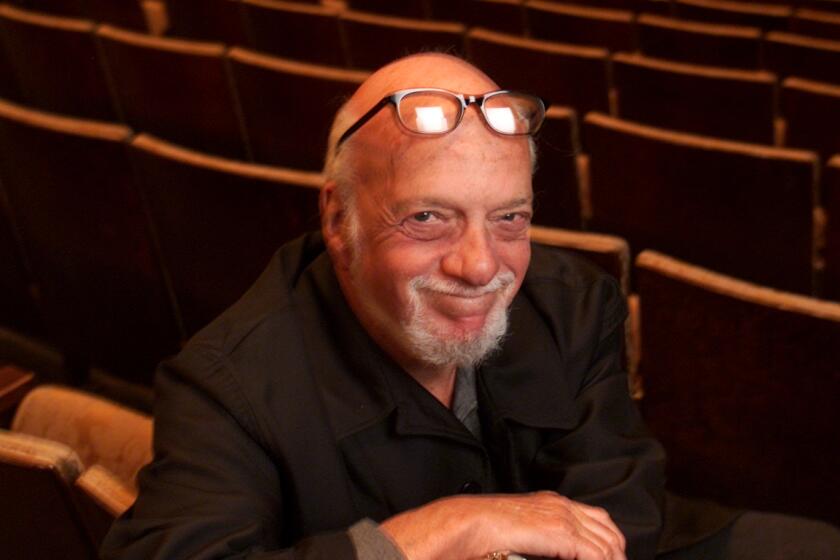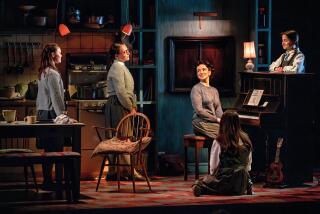Review: Under-performed feminist masterpiece ‘Fefu and Her Friends’ is reborn at the Odyssey
Chief among the many reasons to recommend the new revival of María Irene Fornés’ “Fefu and Her Friends” at the Odyssey Theatre is the rarity of the opportunity. Good productions don’t come around all that often of this masterwork by the Cuban-born American playwright who died last year.
Fornés’ 1977 drama — about a group of women in 1935 New England convening at the home of the title character for a meeting that turns into a freestyle consciousness-raising session — is a landmark of feminist theater. But the play, while regularly taught in college theater seminars, is less commonly revived because of its complicated logistics.
Long before immersive theater was a trend, Fornés, one of the trailblazing figures of the off-off-Broadway movement, was experimenting with the form by having the middle section of “Fefu” take place in four different rooms. The audience breaks up into groups, with each group taking turns eavesdropping on a different set of characters.
After everyone has undergone the full tour of scenes, the audience reunites for the third and final section, which takes place in the same space as Part 1, the living room of Fefu’s home. The circular structure of the play, in which the characters gather, disperse and provisionally reassemble, is perhaps another reason the work isn’t widely performed.
Fornés, like Fefu, was an audacious thinker eager to break new ground, and “Fefu and Her Friends” refuses to conform to stylistic or ideological conventions. The play is exploratory in both content and form. Rather than setting out to confirm one strain of thinking on sexual politics, it dynamically dramatizes the interplay of perspectives of eight female characters, gay and straight, all of whom are grappling with the warping effect of patriarchal culture on their sense of self.
“Fefu and Her Friends,” directed with passionate conviction by Denise Blasor, holds a unique place in modern American drama in part for the way it confronts the shared yet unspoken terrors of female identity. It’s one of those plays that, in validating the morass of feelings left behind by oppression, expands the range of possibilities of being.
Hal Prince redefined the musical and Broadway in the second half of the 20th century.
Played with just the right rough vivacity by Tiffany Cole, Fefu launches the drama with an offhand remark that startles her friends: “My husband married me to have a constant reminder of how loathsome women are.” Seeing that her gambit has disquieted Cindy (Tanya Gorlow) and Christina (Dominique Corona), the outrageous yet ever-gracious Fefu explains her attraction to repulsive ideas by way of a metaphor.
In the same way that people are fascinated when they turn over a smooth stone in damp soil and find that it’s “slimy and filled with fungus and crawling with worms,” she is drawn to the dark side of everyday reality. “If you don’t recognize it ... it eats you,” she whispers.
But something is eating Fefu from within. As she confides to flamboyant, free-spirited Emma (Sydney A. Mason), “I am in constant pain. … It’s not physical, and it’s not sorrow.” She wonders if she’s lacking “a spiritual lubricant,” without which “life is a nightmare, and everything is distorted.”
Dreams play an important role in “Fefu and Her Friends,” which dips into the surreal as a natural extension of the real. Hallucinations also figure prominently. Julia (played by Sandy Duarte with pulverizing emotion), who’s been in a wheelchair since a strange hunting accident left her unable to walk even though the bullet apparently only hit a deer, suffers from horrific visions of judges persecuting her for being a woman.
“Hallucinations are real, you know,” Julia explains to the other women before their rehearsal for an upcoming presentation on the role of the arts in educational reform. “They are not like dreams. They are as real as all of you here.” As real even as the internalized voices ensuring women stay in their subordinated place.
The conflict between Fefu and Julia, a subterranean struggle fueled by the love and concern both women have for each other, shapes the drama in mysterious ways. Julia can see that Fefu is in danger while Fefu is frustrated that her bright and once fearless friend has resigned herself to death.
A gun Fefu jokingly fires in the first act at her husband (who remains outside in a temporary banishment of the patriarchy) comes into play in the final act in accordance with Chekhov’s rule that a firearm must not go to waste in a drama. Naturally, Fornés’ application of this law is unique to her, and one of the compelling points of interest of “Fefu and Her Friends” is trying to understand an ending that departs from the limitations of logic to find meaning in symbolism and theatrical tableau.
The acting in Blasor’s production, which makes ingenious use of various spaces at the Odyssey through the detailed decor of scenic designer Frederica Nascimento and the moody lighting of Katelan Braymer, is stylized in the manner of a 1930s movie. At moments the frisky mannerisms of the women (dressed in period costumes designed by Blasor and Josh LaCour) put me in mind of George Cukor’s “The Women.” The reference isn’t completely incongruous, as there’s a frolicsome quality to Fornés’ writing. But the interaction, even when a water fight breaks out over who will do the dishes, is never nasty. A flirty, rambunctious affection prevails.
Blasor elicits the necessary spirit of camaraderie for a play that bestows even on its splintered audience a heightened sense of connection. If all the characterizations aren’t fully formed, the teamwork is nonetheless exemplary.
Cole’s Fefu, with her Mae West shrugs and fierce quality of carefree love, and Duarte’s piercing Julia, a soul writhing in confined torment, are the emotional core of the production. But moving work from Mason’s majestic Emma, Corona’s conventional yet reflective Christina, Cynthia Yelle’s romantically grieving Paula, Gorlow’s level-headed Cindy, Alexis Santiago’s cheerfully pragmatic Sue and Jennifer Lee Laks’ poignantly conflicted Cecilia contributes to the depth of feeling.
“Fefu and Her Friends” isn’t falsely consoling, but it does uphold a community’s potential to heal identities that have been battered and bruised by the larger society. Fornés’ recognition that “we cannot survive in a vacuum” is given lasting texture by her understanding, as expounded in Cecilia’s educational philosophy, of the importance of being “sensitive to the differences in ourselves as well as outside ourselves.”
'Fefu and Her Friends'
Where: Odyssey Theatre, 2055 S. Sepulveda Blvd., West Los Angeles
When: 8 p.m. Fridays-Saturdays, 2 p.m. Sundays (additional performances on select weeknights; full schedule online), through Sept. 29
Tickets: $32-$37
Info: (310) 477-2055, Ext. 2; OdysseyTheatre.com
Running time: 2 hours, 20 minutes
More to Read
The biggest entertainment stories
Get our big stories about Hollywood, film, television, music, arts, culture and more right in your inbox as soon as they publish.
You may occasionally receive promotional content from the Los Angeles Times.












